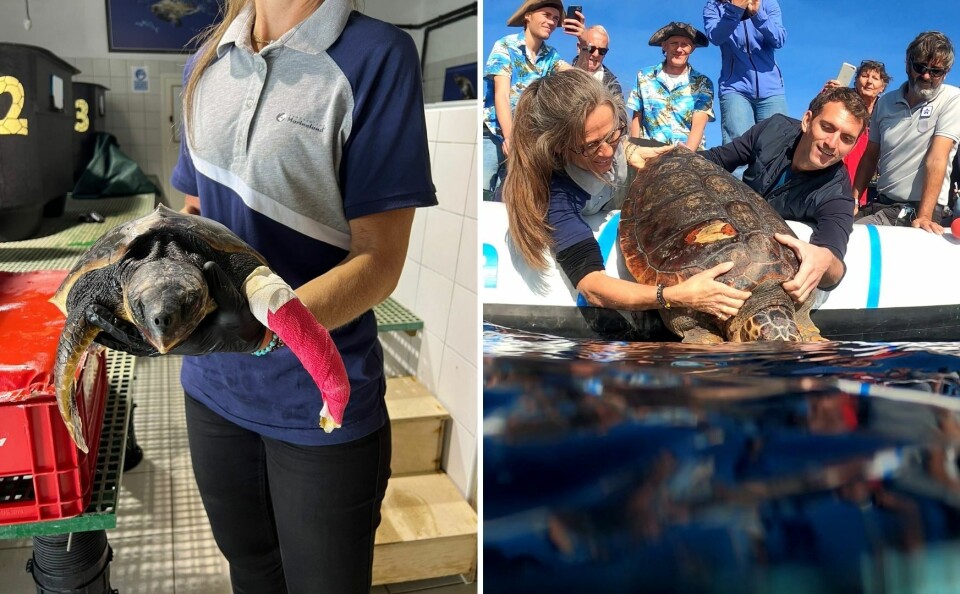-
Car that caused Marseille wildfire did not have valid roadworthiness test
Flames from engine led to devastating fire - but car should not have been on road
-
Native cases of chikungunya rising in France: symptoms and prevention tips
Domestic case of the disease was reported in Grand-Est region for first time
-
Fancy fowl and posing peacocks: observe the flamboyance of female birds in France
Jonathan Kemp explores the captivating courtship displays of birds, and explains how you can too
The turtle hospital rescuing Loggerheads injured on French shores
France’s Mediterranean beaches may become future breeding grounds for sea turtles but they are at risk of injury - from humans

Scientists have been amazed to discover that a single Loggerhead sea turtle has twice laid large clutches of eggs on a beach in Var.
The first time was in 2016 when she laid 74 eggs on a beach near Fréjus, and she came back in 2020 and laid a second clutch of 100 eggs. Although the second time she was with another female, she alone laid eggs in both nests.
Read more: Turtle lays 100 eggs on beach in southern France, tourists kept away
On both occasions marine biologists took samples from the remaining shells in order to run genetic tests.
As no testing will be carried out on the mother turtle, it isn’t possible to know her age, or health status. But scientists note that she seems determined to repopulate the Mediterranean Sea all on her own.
Greece, Turkey and Cyprus are usual breeding grounds
Loggerhead turtles are native worldwide. An adult weighs an average of 135 kilograms, but they can grow to 450 kilograms. Their shells grow to around 90cms in length.
Sexual maturity is reached at around 20 years old, and it is common for females to lay no eggs for 3-4 years. Lifespan is approaching 70 years.
Normally, turtles lay eggs on the coasts of Greece, Turkey and Cyprus rather than France, so scientists will be monitoring the beaches closely this summer in case this heralds a change in breeding grounds.
Read more: VIDEO:Turtles hatch and fight way to sea on French beach
Public asked to report sightings
The project, the ‘Observatoire des Tortues Marines en Méditerranée’ is led by the ‘Association Marineland’ and the ‘Réseau Tortue Marine de Méditerranée Française’.
On average, 100-150 sea turtles are observed off the coast of Alpes-Maritimes and Var each year, and the ‘Observatoire des Tortues Marines en Méditerranée’ encourages members of the public to report any sightings they make, either at sea or on the beaches via their website.
Turtles injured by human activity
Injured turtles found at sea or stranded on a beach, should not be touched but their location should be reported immediately to the emergency CRFS helpline 06 16 86 26 86.
The CRFS (Centre de Réhabilitation de la Faune Sauvage) is a sea turtle hospital run by Association Marineland.
“Last spring we rescued two young sea turtles, who staff named Pirac and Calypso,” says spokesperson Romain Serigne.
The pair were found floating off the coast of Var.
“Pirac had a badly injured front flipper and was entangled in a large plastic bag, Calypso had a fractured shell, very probably inflicted by a boat propeller. Neither was fully grown.”
Both Loggerhead turtles were successfully treated at the hospital last summer and re-released into the Mediterranean last autumn.
“They were the 16th and 17th turtles rescued by the hospital since it was founded in 2017, and illustrate very clearly the impact of human activity on marine life.”
Related articles
Pollution: Complaint lodged over plastic microbeads on French coast
Mystery of thousands of fish washed up on beaches in Brittany
Man gets second-degree burns from 'pebble' found on French beach
























